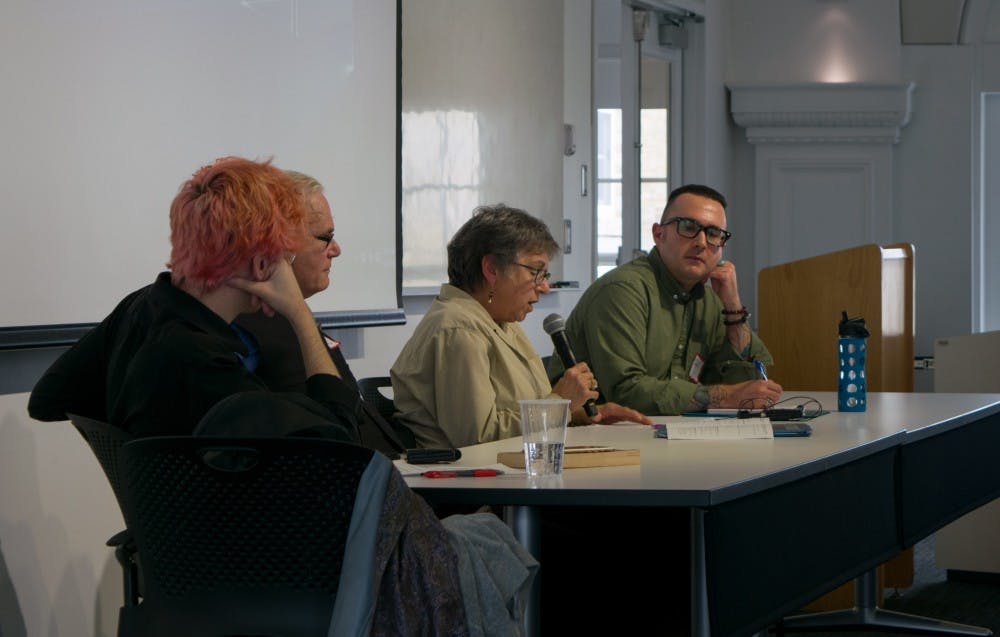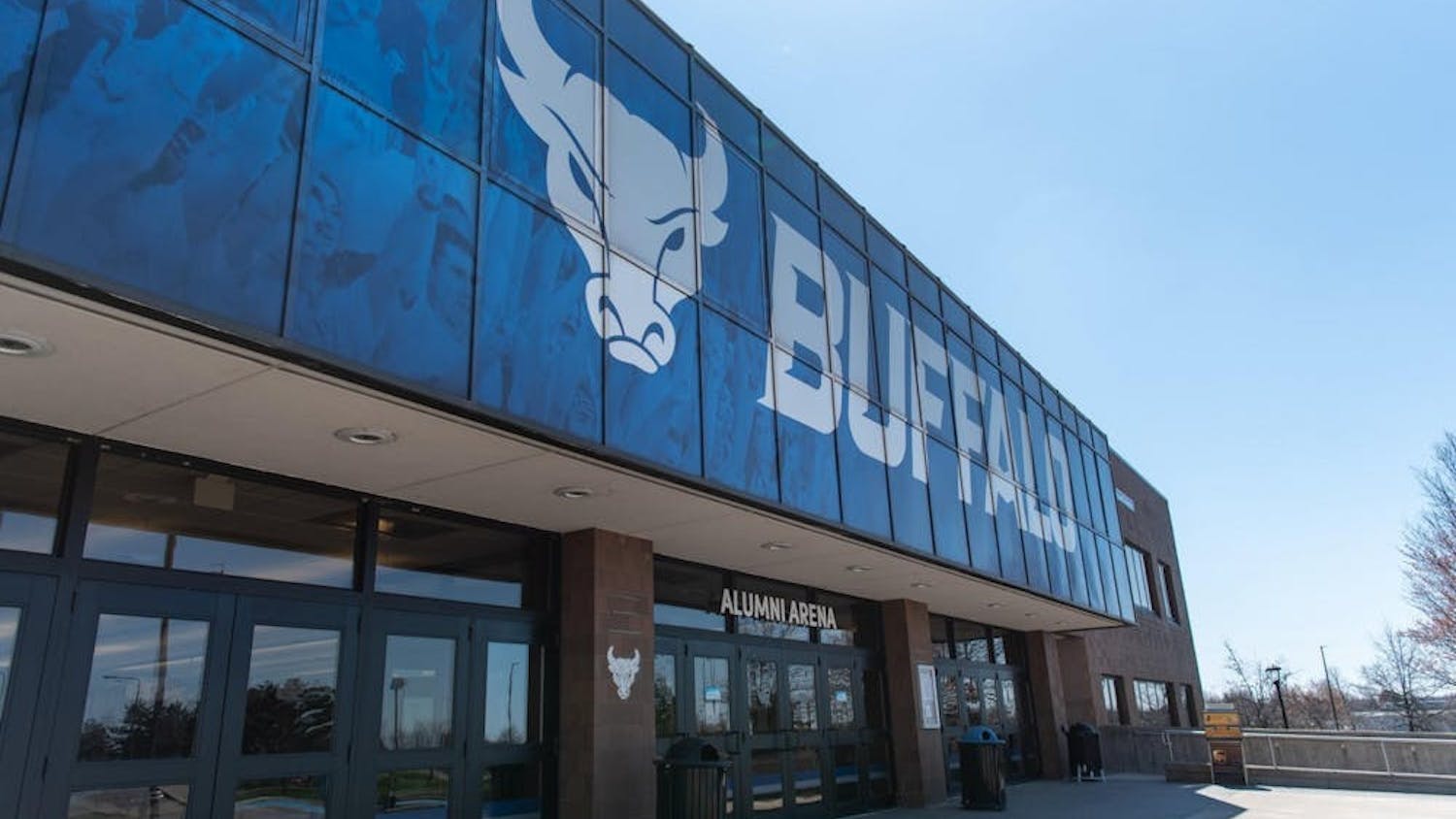UB community members gathered this past weekend to discuss influential moments in local LGBTQ and feminist history.
On Friday and Saturday, UB’s Department of Global Gender and Sexuality Studies, the English department and history department, among others, hosted a symposium, street tour and archival tour of Buffalo’s queer, transgender and feminist milestones. The departments held the event on Friday and Saturday on South Campus, at Buffalo State College and throughout downtown Buffalo.
From current UB faculty members and students to local LGBTQ activists, attendees centered their focus on queer experiences, subcultures and history in Western New York.
Friday’s symposium featured discussions around Buffalo’s queer and transgender histories in Hayes Hall. The two-day event was organized by Christine Varnado, an assistant professor in the GGSS department.
“This event celebrates a part of UB's history that doesn't get nearly enough attention,” Varnado said. “This place was the epicenter of radical, cutting-edge thought in so many different disciplines of the humanities and arts.”
Participants in Friday’s event reviewed the 1960s and 1970s. This was a time of student-led protests and “radical ideologies” forming within UB and the city of Buffalo. In the late ‘60s, due to political and social activism, students redefined the meaning of then-university President Martin Meyerson’s goal for UB to become the “Berkeley of the East.”
By 1969, UB community members formed Tolstoy College, a group that promoted pacifism and was against the ongoing Vietnam War. On WBFO, then a UB-owned and operated radio station, students addressed LGBTQ concerns on a segment titled “Stonewall Nation.”
UB’s history with activism set the scene for some of Friday’s discussion amongst symposium panelists.
The first panel included Jeffry Iovannone, a women’s and gender studies professor at SUNY Fredonia. Iovannone explained the lack of transgender acceptance by the LGBTQ community in the ‘70s. He focused his talk on Peggy Aimes, a transgender public figure in Buffalo who was ostracized for her identity. He also touched on the founding of the Mattachine Society of the Niagara Frontier, an organization that fought for gay liberation.
Other panelists included Carol Speser, a local political and social activist, and Jonathan Katz, director of the visual studies doctoral program at UB. Among other achievements, Speser helped set up Buffalo’s first outdoor pride parade along with her fights to pass local gay rights legislation. Katz explained how he, too, was involved with helping pass legislation in Chicago. He also spoke about how he came out publicly on the Phil Donahue Show as a teenager during a time when gay people were largely ignored by mainstream society.
As the first panel came to a conclusion, the second panel focused their discussion on UB’s Women’s Studies College, founded in 1971 and one of the first programs of its kind in the United States.
At the panel’s keynote roundtable, Elizabeth Lapovsky Kennedy, Bonita Hampton and Sherri Darrow discussed the roots of the department.
Kennedy, author of “Boots of Leather, Slippers of Gold,” explained how UB was “anti-racist, anti-imperialist and feminist” in the ‘70s. This, she said, wasa factor in the establishment of Women’s Studies College.
The program focused on gaining university support for women’s rights and leadership. Hampton, a professor at SUNY Oswego, spoke on the program’s dedication for minority women and her own transformative experiences in academia. Darrow, director of health promotion at UB, elaborated on institutional struggle and her department’s fight to remain active, as well.
“I think we have a lot to learn from our history. Understanding the importance of education for women about women’s status, and building the quality of a larger world, is still a project that needs to be ongoing,” Darrow said.
The symposium closed with a queer and transgender history panel, which featured speakers such as Ari Moore, a local activist and archivist, and Adrienne Hill of the Buffalo Niagara LGBTQ History Project. Panelists discussed the transgender and queer community’s difficulty with violence and discrimination, intersectional liberation and transgender inclusivity.
The symposium included a number of Q&A segments, where students, faculty, activists and alumni could share their stories and ask questions. Issues addressed included the imminent shutting down of the queer studies program and wages for UB’s adjunct faculty and TAs.
The event was significant to many attendees, such as Jared Auton, a graduate student in the visual studies program at UB who helped set up Friday’s symposium.
“Events like this, especially for a university community of young people and faculty where some of them are activists, it’s really essential to the continued growth and activism of the queer community at large. It tells people not to take their rights for granted,” Auton said.
Other attendees, such as Juhi Roy, a representative of the Graduate Student Employees Union, echoed Auton’s sentiment.
“I didn’t have the privilege of taking classes like this, so these are the events where I learn more and I have a lot of my close friends that are gays and lesbians and belong to the transgender [community],” Roy said.
“I make sure I come and attend these events, because it also allows me to talk about it in some other place where people are not much aware of it.”
Abhi Wagh is a staff writer and can be reached at features@ubspectrum.com.





